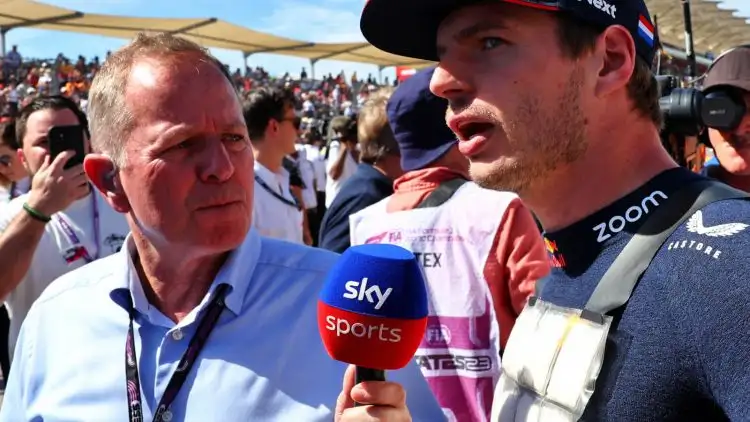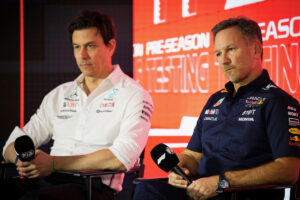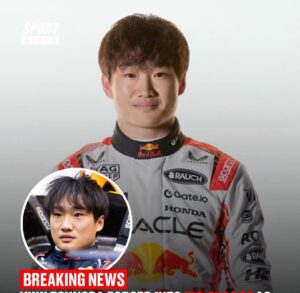F1 NEWS:Martin Brundle responds to accusations of B…read more

F1 NEWS:Martin Brundle responds to accusations of B…read more
Former Formula 1 driver and renowned commentator, Martin Brundle, has strongly rebutted accusations from Max Verstappen and Red Bull’s Chief Technical Officer, Adrian Newey, regarding alleged British media bias. Both Verstappen and Newey had recently criticized what they perceive as a tendency within the UK press to unfairly target their team, particularly in the context of Verstappen’s dominant performances in recent seasons.
In interviews and public statements, Verstappen and Newey expressed frustration with the level of scrutiny Red Bull and their star driver have received from British media outlets. Verstappen suggested that the negative tone of some reports was reflective of an inherent bias, while Newey, a key figure in Red Bull’s unprecedented success, hinted that the media focus on their dominance had at times crossed into unfair criticism.
Brundle, who has been a fixture of Formula 1 broadcasting for decades, was quick to respond to these claims. While acknowledging Verstappen’s and Red Bull’s impressive success on the track, Brundle argued that the British media’s focus on the team is not driven by bias, but rather by their position at the top of the sport. He stated that British journalists have a long tradition of holding F1 teams and drivers to high standards, but emphasized that this is part of the job in the highly competitive and high-profile world of motorsport.
“Whether you’re a fan or a driver, the media’s role is to reflect the reality of the sport. It’s about reporting what happens on track, whether it’s success or failure. And right now, Red Bull and Max are at the forefront of F1, so naturally, they will attract a lot of attention,” Brundle said in an interview. “It’s not about bias, it’s about the public’s interest in their success. When you’re at the top, the scrutiny is always going to be higher.”
The Dutch driver’s exceptional form in recent seasons, particularly during his back-to-back World Championship wins in 2021 and 2022, and his continued dominance in 2023, has made him the focal point of much of the media narrative. Brundle pointed out that Verstappen’s performances on track — breaking records and consistently outpacing his rivals — have naturally led to intense media coverage, both positive and critical.
While Brundle acknowledged that Verstappen has faced some critical commentary, he stressed that such scrutiny is typical of any athlete at the pinnacle of their sport. “When you’re consistently winning, like Max is, you’re going to get all kinds of opinions — from adoration to criticism. That’s part of being in the public eye,” Brundle said.
The accusations of bias also tap into a broader conversation about the role of the media in Formula 1. Historically, British media has had a close connection to the sport, with many of the top teams and drivers hailing from the UK. As such, the media’s coverage has often been scrutinized for potential favoritism or perceived national bias. However, Brundle pointed out that while the media landscape is shaped by the sport’s British roots, it is increasingly global, with journalists from across the world covering F1, making it harder to argue that there is any singular national bias in reporting.
The scrutiny faced by Verstappen and Red Bull is not unique to the Netherlands or the UK either. Brundle noted that other teams and drivers who have dominated in the past, such as Ferrari and Mercedes, have also faced intense media focus — both positive and negative. “It’s not new to be under the microscope when you’re winning. It’s just the nature of the beast,” he said.
As Formula 1 continues to grow in popularity, particularly in markets like the United States and across Europe, media dynamics are evolving. With social media and fan-driven content playing an increasingly influential role in shaping public opinion, traditional media outlets may face more pressure to align with popular sentiment or risk alienating certain fanbases.
For Brundle, however, the core responsibility of the media remains unchanged. “Our job as commentators and journalists is to tell the story of the sport. Right now, Max Verstappen and Red Bull are writing one of the most dominant chapters in F1 history, and that’s what the media is covering — the good, the bad, and everything in between.”
This latest back-and-forth between Brundle, Verstappen, and Newey highlights the complex relationship between Formula 1, the media, and the athletes at the heart of the sport. As the 2024 season unfolds, it seems likely that the conversation about media coverage, team dynamics, and bias will continue to evolve — particularly as new rivalries and controversies emerge both on and off the track.





